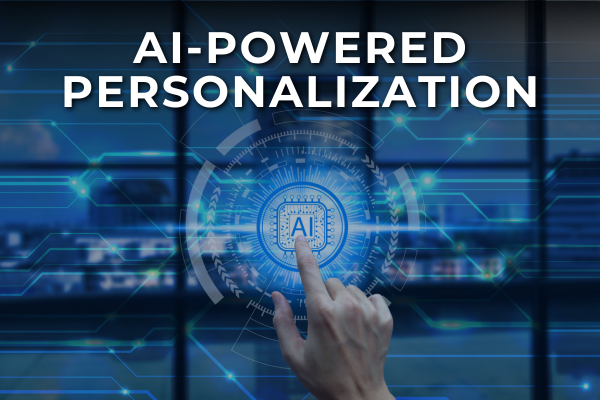
AI-powered personalization revolutionizes how businesses engage with customers by delivering tailored experiences. It leverages artificial intelligence to analyze vast data sets, predict customer preferences, and automate personalized interactions. This guide explains its importance, applications, benefits, and how to implement it effectively.
Table of Contents
ToggleWhat is AI-Powered Personalization?
AI-powered personalization uses advanced AI algorithms and machine learning to customize content, product recommendations, and digital marketing strategies based on individual user data. It combines historical behavior, preferences, and real-time interactions to create unique, impactful customer experiences.
Importance of AI-Powered Personalization
Enhanced Customer Experience
Tailored solutions meet customer needs effectively.
Builds stronger emotional connections with the brand.
Increased Engagement
Personalized content improves click-through and conversion rates.
Keeps users engaged with relevant offers and messages.
Higher ROI
Focused marketing efforts lead to better resource utilization.
Boosts sales and reduces customer acquisition costs.
Data-Driven Decision Making
AI uses real-time analytics for precise targeting.
Informs future strategies with actionable insights.
Key Applications of AI-Powered Personalization
E-commerce
Product Recommendations: Suggests items based on browsing history, purchases, and preferences.
Dynamic Pricing: Adjusts prices in real-time to maximize sales and profits.
Content Personalization
Customizes blogs, videos, and newsletters for each user.
AI analyzes engagement patterns to curate relevant content.
Email Marketing
Sends targeted emails based on user behavior, demographics, and preferences.
Boosts open rates with personalized subject lines and offers.
Customer Support
AI-powered chatbots provide instant, personalized responses.
Improves issue resolution time and customer satisfaction.
Healthcare
Offers tailored health advice based on patient data.
Personalizes fitness plans, medication reminders, and more.
Entertainment
Streaming platforms recommend shows and movies based on viewing history.
Enhances user retention with engaging content suggestions.
Benefits of AI-Powered Personalization
Better Customer Retention
Retains users by continuously delivering relevant content.
Fosters loyalty through tailored experiences.
Streamlined Marketing
Automates campaigns for better efficiency.
Reduces manual effort while increasing accuracy.
Predictive Insights
Identifies trends and predicts future customer behavior.
Prepares businesses to meet changing demands proactively.
Improved Customer Acquisition
Attracts new customers with hyper-targeted ads.
Leverages data to create campaigns that resonate.
Scalability
Applies personalization strategies across large audiences effortlessly.
Adapts to growing customer bases without additional effort.
How to Implement AI-Powered Personalization
Collect Data
Use analytics tools to gather user data from multiple channels.
Ensure compliance with data privacy regulations like GDPR.
Segment Your Audience
Divide your audience into segments based on behavior, demographics, and preferences.
Use AI tools for automated segmentation.
Adopt AI Tools
Choose platforms like Salesforce, HubSpot, or Adobe Sensei for personalization.
Implement machine learning algorithms to predict user preferences.
Test and Optimize
Use A/B testing to evaluate the effectiveness of personalized strategies.
Continuously optimize content and strategies based on results.
Leverage Predictive Analytics
Utilize predictive models to anticipate user needs.
Adjust marketing efforts accordingly to stay relevant.
Integrate with Omnichannel Strategies
Ensure seamless personalization across all customer touchpoints.
Synchronize online and offline data for a holistic approach.
Challenges in AI-Powered Personalization
Data Privacy Concerns
Addressing user concerns about how their data is used.
Implementing strict compliance with privacy regulations.
Algorithm Bias
Avoiding biases that lead to unfair personalization.
Regularly reviewing and refining AI models for fairness.
Implementation Costs
Investing in AI tools and infrastructure.
Ensuring ROI justifies the initial expenses.
Complexity in Integration
Integrating AI with existing systems can be challenging.
Requires skilled professionals for seamless integration.
Dependence on Data Accuracy
Ensuring data is clean, up-to-date, and comprehensive.
Inaccurate data can lead to irrelevant personalization efforts.
Future Trends in AI-Powered Personalization
Real-Time Personalization
Delivering instant recommendations during customer interactions.
Enhancing live chat and chatbot experiences with real-time insights.
Voice Search Optimization
Personalizing experiences for users interacting through voice assistants.
Tailoring results based on vocal queries and preferences.
Hyper-Personalization
Combining AI and IoT for deeply personalized experiences.
For example, smart devices adjusting based on user behavior.
AR/VR Integration
Personalizing augmented and virtual reality experiences.
Tailoring immersive experiences for gaming, shopping, and training.
AI-powered personalization is transforming how businesses connect with customers by delivering tailored experiences at scale. From e-commerce to healthcare, its applications are vast, and its benefits undeniable. By leveraging AI tools, predictive analytics, and omnichannel strategies, businesses can stay ahead of the competition, improve customer satisfaction, and drive significant ROI.
Embrace AI-powered personalization today to unlock new growth opportunities and redefine customer experiences.

